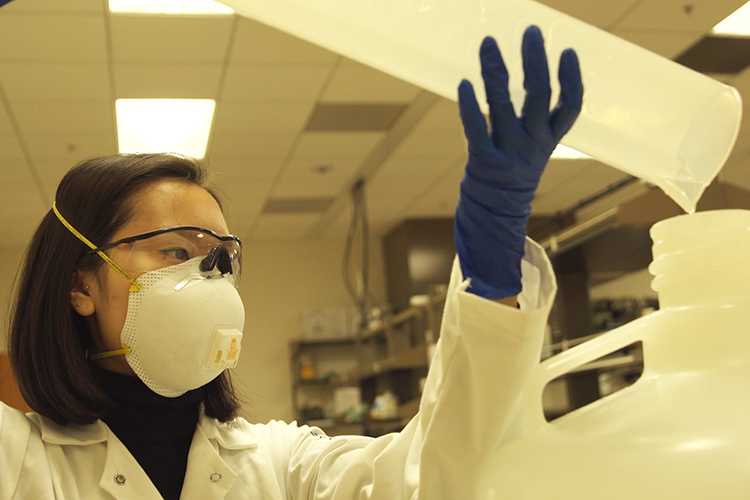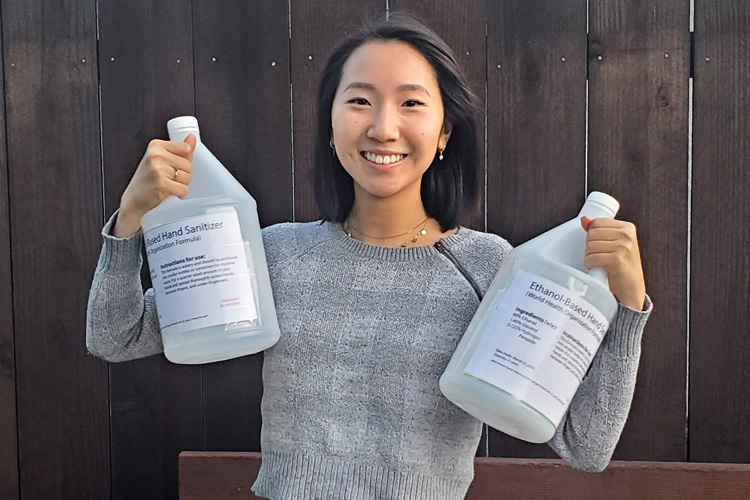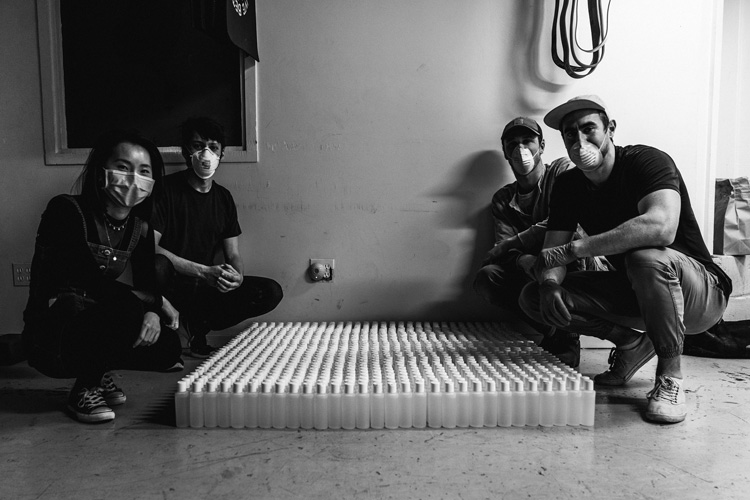‘Liquid gold’: UC Berkeley lab makes free hand sanitizer for the needy
Biochemistry lab pivots to hand sanitizers for homeless and other vulnerable groups

April 13, 2020
When University of California, Berkeley, graduate student Abrar Abidi heard that several staff members at the San Francisco County Jail had tested positive for COVID-19, he and others worked around the clock to manufacture, package and deliver more than 900 bottles of hand sanitizer to the jail – enough for each inmate at all five county lockups.
“We knew that once the sheriffs had caught the infection, any day it could spread to the inmates. And that would be the beginning of an absolute, nightmarish catastrophe,” said Abidi. “We triaged our entire supply of sanitizer to fill 900 bottles, and the next morning, we went with a team of friends and activists to one of the county jails to donate them. From there, they were distributed to every single county jail inmate in SF.”
That was the weekend of March 28, a blur in a whirlwind of activity for Abidi and UC Berkeley colleague Yvonne Hao. All told, since March 17 — the first day of a statewide shelter-in-place mandate — the two have worked day and night to mix more than 400 gallons of sanitizer, using a student teaching lab in UC Berkeley’s Li Ka Shing Center for Biomedical and Health Sciences, a loyal cadre of lab mates and ingredients that are standard supplies in many biology labs.
They and a couple of dozen volunteers then distributed the free sanitizer — in small bottles as well as gallon jugs — to homeless shelters, senior centers, hospices, health centers, jails and other places in the East Bay and San Francisco that have suffered shortages of sanitizer or that serve populations whose safety has been largely ignored as the COVID-19 pandemic rips through the state.
“Yvonne and I shared a tacit understanding that we were willing to do whatever it would take to get this into the hands of every homeless person, every elderly care center, every frontline health care worker in the Bay — everyone most vulnerable or dispossessed, those for whom social distancing is an extravagance,” Abidi said.
The ease with which the two ramped up, with enthusiastic support from faculty lab leaders Robert Tjian and Xavier Darzacq, has encouraged labs in other UC Berkeley buildings to start producing sanitizer and to provide backup for Abidi or Hao, in case they get sick.
“We have been working with, among many others, the Department of Homelessness (and Supportive Housing) in San Francisco, which told us that there should be no cap on what we give them, that we could supply them with hundreds of gallons of sanitizer, and it still wouldn’t be enough. That is quite a sobering reality,” Abidi said.
According to Tjian, a professor of molecular and cell biology, while a few of his 20-some graduate students have pivoted to COVID-19 work, most have been idled because labs are off-limits for non-essential research. “I couldn’t imagine a better use of their (Abidi and Hao’s) time,” he said. “They’re probably truly helping people at a very fundamental level.”

The UC Berkeley lab is set up to produce 120 gallons of hand sanitizer per week to distribute around the Bay Area. (Photo courtesy of Ryland Hormel)
For Hao, who graduated with a B.A. in molecular and cell biology in May 2019 and has been working as a research assistant in Tjian’s lab since then, the production of hand sanitizer is an extension of her other community service. Both as an undergraduate and now, she has volunteered regularly at UC Berkeley’s Suitcase Clinic and at Hospice by the Bay.
“Some of the first places that came to my mind were senior centers and hospices with terminally ill patients,” she said. “If the virus gets into those places, it will be an absolute disaster, just like it was in Washington.”
Early in the pandemic, residents of the Life Care Center of Kirkland, in Washington, became infected with COVID-19, ultimately leading to the deaths of at least 37 seniors.
“We want to distribute to populations where self-isolation, self-quarantine and social distancing are not an option,” said Hao. “I really believe that social distancing is a privilege and luxury that not everyone has. Those vulnerable and underprivileged populations, as well as front-line health care workers who don’t have the ability to isolate themselves due to the conditions of their jobs — those are the people we are trying to help.”
‘Good will is at an all-time high’
Having worked for two years in an infectious disease lab studying tuberculosis before coming to UC Berkeley, Abidi immediately knew that COVID-19 could spread widely and was frustrated that hand sanitizer — a proven and powerful precautionary measure — had disappeared from store shelves as worry about the coronavirus increased. Labs like his keep lots of alcohol on hand — ideal for killing viruses — so he figured he’d mix some with aloe vera and supply himself, his lab mates and friends with enough sanitizer to keep them safe.

Yvonne Hao with two of the many bottles of hand sanitizer she and Abrar Abidi manufactured to help the needy fend off coronavirus. (Photo courtesy of Prapon Homvech)
When he mentioned his plan at a lab meeting held before the state shelter-in-place mandate, Hao quickly offered to help, and the two sourced aloe vera in drugstores. It, too, was out of stock. Hao soon realized, however, that all the ingredients necessary to make sanitizer using the World Health Organization’s formula — ethanol, glycerol, hydrogen peroxide and a bit of isopropyl alcohol to denature it and make it undrinkable — were already in stock on campus.
“Within a day or two, we felt a deep moral uneasiness about the fact that we could make it for ourselves, but that the vast majority of people in this city and around the Bay did not have that power — not least, the poorest of those around us,” he said. “We thought, ‘Is there any way that we can reach out to others?’ At the very least we could donate some of this stuff to local shelters, starting with Yvonne’s connection to the Suitcase Clinic.”
With the support of Tjian and Darzacq, an associate professor of molecular and cell biology, to cut through red tape and get approval from the campus’s fire marshal and Office of Environmental Health and Safety — 95% ethanol is flammable — they quickly got up to speed, churning out gallons of hand sanitizer. Hao and Abidi reached out to their networks to locate shelters and other places eager to receive the gift, and friends and fellow activists immediately volunteered to help deliver it. The Berkeley Outreach Coalition has been key to distributing the sanitizers broadly to homeless shelters and encampments in the East Bay, while San Francisco Supervisor Dean Preston, an advocate for housing the homeless in empty hotel rooms during the epidemic, and his staff have helped assemble a coordinated infrastructure for distribution.

Hao and Abidi, left, were joined by Anthony Turner and Ryland Hormel at their distribution center in San Francisco, prior to delivering personal-size bottles of hand sanitizer to vulnerable groups in the city. (Photo courtesy of Ryland Hormel)
“Our friends on the distribution end tell us stories. The staff at so many overcrowded, under-resourced shelters apparently receive it like a godsend,” Abidi said. “In the city, people have taken to calling it liquid gold.”
“Abidi and Hao truly embody what it means to ‘meet the moment’ during challenging times,” said state Assemblymember Buffy Wicks (AD-15), whose office helped distribute hand sanitizer to homeless residents of the East Bay through Operation Dignity in Oakland and the Greater Richmond Interfaith Program in Richmond. “My office was proud to play a role in the packaging and distribution of their ‘liquid gold,’ and we’ve been continually inspired by what these students have proven to be possible. They’ve set the bar high for the spirit of service – in our district, and beyond.”
The operation’s San Francisco distribution team launched a GoFundMe campaign to buy personal-size plastic bottles for hand sanitizer and to help distribute them to the homeless. It has already raised more than $10,000. A local bottle manufacturer, Alameda Packaging, donated 2,000 free bottles. East Bay volunteers also recently launched a GoFundMe campaign to “put a bottle of sanitizer in the hands of every unhoused, at-risk of being unhoused, or incarcerated person in the East Bay.”
Despite a few glitches, like the failure of one ethanol delivery to arrive in time, they have now established a steady supply of materials to guarantee production of 120 gallons of sanitizer per week for the indefinite future. To date, the several thousand-dollar cost for chemicals has been covered by Tjian’s discretionary funds.
“Good will is at an all-time high,” Hao said. What made the project succeed, she added, is that “both of us are optimistic, idealistic and perhaps somewhat crazy people. One day, we just came to the sudden realization that we can make enough hand sanitizer for all the homeless people in the Bay. That statement initially sounded insane, but now that I’ve seen the scale at which we have been able to produce the sanitizer, I think it is actually feasible.”
Their optimism has convinced several other UC Berkeley labs — including those of Elçin Ünal, an assistant professor of molecular and cell biology, in Barker Hall and Russell Vance, a professor of immunology and pathogenesis, in the Life Sciences Addition — to start their own production lines.
Abidi and Hao admit to being disappointed that government agencies haven’t stepped up to provide sufficient hand sanitizer to front-line workers, such as firefighters and health care professionals, or people in communal living situations, such as prisons and shelters. And while some breweries and distilleries have turned to production of hand sanitizer, they typically sell their product for profit or at cost. The two believe the sanitizer should be free to such people — a basic right and not a commodity.
“In many ways the government has been quite negligent in this regard. There is such a shortage of hand sanitizer, yet there is so much ethanol,” Hao said. “It doesn’t really make sense to me why the government hasn’t taken more action on that yet. We are just trying to compensate for that fact.”